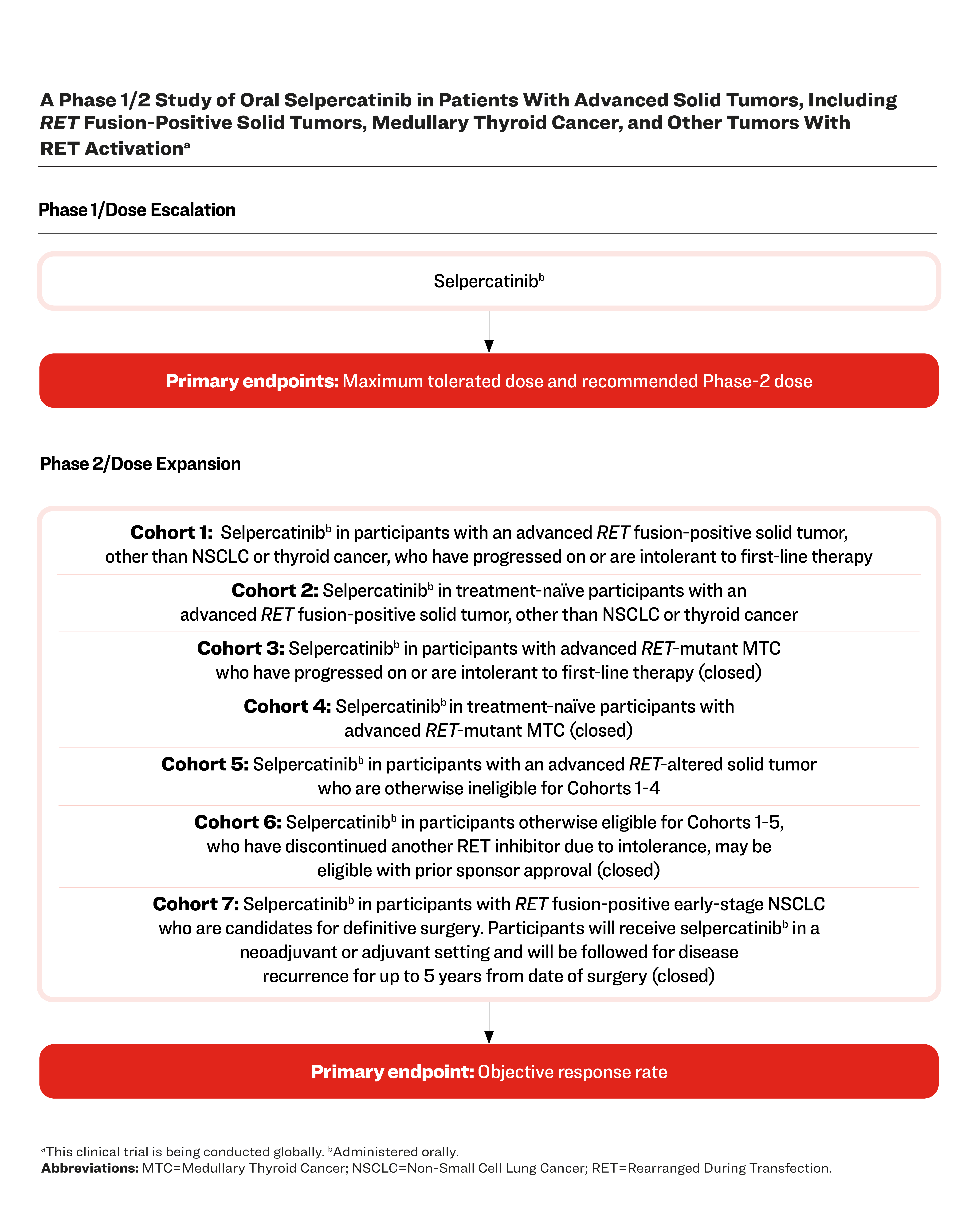RET Inhibitor
Selpercatinib
Phase
2
Active, not recruiting
A Phase 1/2 Study of Oral Selpercatinib in Patients With Advanced Solid Tumors, Including RET Fusion-Positive Solid Tumors, Medullary Thyroid Cancer, and Other Tumors With RET Activationa
Related Resources:

Key Inclusion Criteria
Phase 1
- Participants with a locally advanced or metastatic solid tumor who:
- Progressed on or are intolerant to standard therapy, or
- For which no standard therapy exists, or in the opinion of the investigator, are not candidates for or would be unlikely to tolerate or derive significant clinical benefit from standard therapy, or
- Decline standard therapy
- Prior multikinase inhibitors (MKIs) with anti-RET activity are allowed
- A RET gene alteration is not required initially. Once adequate PK exposure is achieved, evidence of RET gene alteration in tumor and/or blood is required as identified through molecular assays, as performed for clinical evaluation
- Measurable or nonmeasurable disease as defined by Response Evaluation Criteria in Solid Tumors (RECIST) 1.1 or Response Assessment in Neuro-Oncology (RANO) as appropriate to tumor type
- Eastern Cooperative Oncology Group (ECOG) performance status of 0-2 or Lansky Performance Score (LPS) ≥40% (age <16 years) with no sudden deterioration 2 weeks prior to the first dose of study treatment
- ≥12 years of age
- Adequate hematologic, hepatic, and renal function
- Life expectancy of ≥3 months
Phase 2
Phase 1 criteria with the following modifications:
- Cohort 1: Participants must have received prior standard therapy appropriate for their tumor type and stage of disease, or in the opinion of the investigator, would be unlikely to tolerate or derive clinical benefit from appropriate standard of care therapy
- Cohorts 1 and 2:
- Enrollment will be restricted to participants with evidence of a RET gene alteration in tumor
- At least one measurable lesion as defined by RECIST 1.1 or RANO, as appropriate to tumor type and not previously irradiated
- Cohorts 3 and 4: Enrollment closed
- Cohort 5:
- Without measurable disease but otherwise meet criteria for Cohorts 1 and 2
- Medullary thyroid cancer (MTC) syndrome spectrum cancers (eg, MTC, pheochromocytoma), cancers with neuroendocrine features/differentiation, or poorly differentiated thyroid cancers with other RET alteration/activation may be allowed with prior sponsor approval
- Cell-free DNA (cfDNA) positive for a RET gene alteration not known to be present in a tumor sample
- Cohort 6: Participants who otherwise are eligible for Cohorts 1, 2, or 5, who discontinued another RET inhibitor due to intolerance, may be eligible with prior sponsor approval (closed)
- Cohort 7: Participants must have a histologically confirmed stage IB-IIIA non-small cell lung cancer (NSCLC) by the American Joint Committee on Cancer (AJCC) version 8. The tumor must have been deemed resectable by a thoracic surgeon, the participant must be determined to be medically operable based on the determination of a thoracic surgeon, and the participant must not have received prior systemic therapy, including prior radiation therapy, for NSCLC (closed)
Key Exclusion Criteria
Phases 1 and 2
- Cohorts 1 and 2 (Phase 2): An additional known oncogenic driver
- Cohorts 3 and 4 (Phase 2): Enrollment closed
- Cohorts 1, 2 and 5 (Phase 2): Prior treatment with a selective RET inhibitor. Note: Participants otherwise eligible for Cohorts 1, 2, and 5, who discontinued another selective RET inhibitor, may be eligible for Cohort 6 (Phase 2) with prior sponsor approval
- Investigational agent or anticancer therapy (including chemotherapy, biologic therapy, immunotherapy, anticancer Chinese medicine, or other anticancer herbal remedy) within 5 half-lives or 2 weeks (whichever is shorter) prior to planned start of selpercatinib. In addition, no concurrent investigational anticancer therapy is permitted. Note: Potential exception for this exclusion criterion will require a valid scientific justification and approval from the sponsor
- Major surgery (excluding placement of vascular access) within 4 weeks prior to planned start of selpercatinib
- Radiotherapy with a limited field of radiation for palliation within 1 week of planned start of selpercatinib, except for participants receiving radiation to more than 30% of the bone marrow or with a wide field of radiation, which must be completed at least 4 weeks prior to the first dose of study treatment
- Any unresolved > Grade 1 toxicities as defined by National Cancer Institute Common Terminology Criteria for Adverse Events (NCI-CTCAE) version 5.0 attributed to prior therapy (other than alopecia and Grade 2, prior platinum-therapy related neuropathy) at the start of study treatment
- Symptomatic primary central nervous system (CNS) tumor, metastases, leptomeningeal carcinomatosis, or untreated spinal cord compression. Participants are eligible if neurological symptoms and CNS imaging are stable and steroid dose is stable for 14 days prior to the first dose of selpercatinib and no CNS surgery or radiation has been performed for 28 days, 14 days if stereotactic radiosurgery (SRS)
- Clinically significant active cardiovascular disease or history of myocardial infarction within 6 months prior to planned start of selpercatinib or prolongation of the QTc interval of >470 ms using Fridericia’s formula
- Required treatment with certain strong cytochrome P450 3A4 (CYP3A4) inhibitors or inducers and certain prohibited concomitant medications
a
This clinical trial is being conducted globally.
b
Administered orally.

